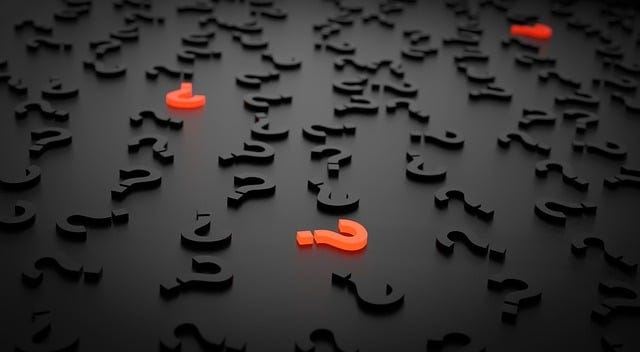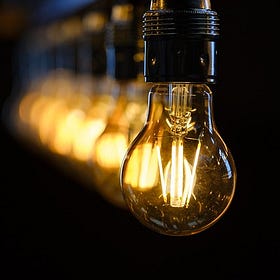Tolstoy’s 3 Questions On The Purpose Of Life
Our four-year old daughter recently started to fear sleeping alone in her bed. She never had problems before but suddenly she did. She would cry and wail unless me or my wife slept with her and quite honestly, it got really frustrating.
Obviously, this is untenable, she needed to learn to sleep on her own. We knew that if we just answered her calls then we were exacerbating the problem and therefore not helping her.
The time we have with our children is the most important time and that time also includes giving them the space to be; the space to be alone and the space to be comfortable with themselves. No phones. No TV. No iPad. Just their own nervous systems and the opportunity to learn how to to regulate it.
Anyway, the most important thing we could do as parents was help our daughter learn to face all the “monsters” (her literal words) outside her window, which reminded me of the story of Tolstoy’s three questions.
The Three Questions
One day a certain emperor realized that if he knew the answers to three questions, he would always be ready for any difficulty. Those three questions were:
What is the best time to do each task?
Who are the most important people to work with?
What is the most important thing to always do?
The emperor announced throughout his kingdom that whoever could answer these questions would receive a big reward. Many people made their way to the emperor’s palace, each one giving a different answer.
In response to the first question, one person suggested that the emperor schedule his days to the hour and then rigidly follow it without question, as only then could he hope to do every task at the right time.
Someone else suggested that the emperor could never hope to have all the foresight and skill necessary to decide when to do each task. Instead, he should establish a wise council and then act according to their advice. But another person noted that some matters require an immediate decision, so waiting for consultation wasn’t practical. Instead, the emperor should consult with magicians and wizards if he wanted to know in advance what was to happen.
The responses to the second question were equally disappointing. One person thought that entrusting the emperor’s administrators was the way to go while another suggested priests and monks and others recommended doctors or warriors.
Answers to the third question presented with a similar shortage of reasonableness. Some people believed science to be the most important pursuit, others contended it was religion, and others believed the military.
Clearly, the emperor wasn’t happy with anybody’s answer, so after several nights of reflection he decided to visit a hermit who lived in the mountains and was believed to be enlightened. However, the emperor knew that this hermit never left the mountains and didn’t speak with anybody of wealth or power, only the poor. So, the emperor disguised himself as a peasant and ordered his attendants to wait for him at the base of the mountain while he climbed alone to speak with the hermit.
Upon reaching the hermit’s home, the emperor found him digging a garden in front of his hut. The hermit saw the stranger and nodded his head in greeting before continuing to dig. The labor was obviously hard on him. He was an old man, and each time he thrust his spade into the ground, he grunted heavily. The emperor approached him and said, “I have come here to ask your help with three questions:
When is the best time to do each task?
Who are the most important people to work with?
What is the most important thing to always do?”
The hermit listened attentively but only patted the emperor on the shoulder and continued to dig. The emperor said, “You must be tired. Here, let me give you a hand.” The hermit thanked him, handed the emperor the spade, and then sat down on the ground to rest. After digging two rows, the emperor stopped, turned to the hermit, and repeated his three questions. The hermit still didn’t respond, but instead stood up and pointed to the spade and said, “Why don’t you rest now? I can take over again.” But the emperor continued.
Finally, the emperor put down the spade and said to the hermit, “I came here to ask if you could answer my three questions, but if you can’t answer them, please let me know so that I can go on my way.” The hermit lifted his head and asked the emperor, “Do you hear someone running over there?” The emperor turned his head. They both saw a man with a long white beard emerge from the woods. He ran frantically, pressing his hands against a bloody wound in his stomach. The man ran toward the emperor before falling unconscious to the ground, where he lay moaning. The emperor and hermit opened the man’s clothes and saw a deep cut. The emperor cleaned the wound and used his own shirt to bandage it, but the blood completely soaked it within minutes. He rinsed out the shirt and bandaged the wound a second time and continued to do so until the bleeding stopped.
Finally, the wounded man regained consciousness and asked for a drink of water. The emperor ran down to the stream and brought back a jug of fresh water. Meanwhile, the sun had set, and the night air turned cold. The hermit helped the emperor carry the man into the hut where they laid him down on the hermit’s bed. The man closed his eyes and lay quietly. The emperor was worn out from a long day of climbing and digging, not to mention the stress of trying to save the man. Leaning against the doorway, he fell asleep. When he rose, the sun had already rose over the mountain and for a moment, he forgot where he was and why he was there. He looked over to the bed and saw the wounded man also looking around in confusion.
When the man saw the emperor, he stared at him intently and then said in a faint whisper, “Please forgive me.”
“What have you done that I should forgive you?” the emperor asked.
“You do not know me, your majesty, but I know you. I was your sworn enemy, and I had vowed to take vengeance on you, for during the last war you killed my brother and seized my property. When I learned you were coming alone to the mountain to meet the hermit, I intended to surprise you on your way back and kill you. But after waiting a long time there was still no sign of you, so I left my ambush to find you. But instead of finding you, I came across your attendants, who recognized me and gave me this wound. Luckily, I escaped and ran here. If I hadn’t met you, I would surely be dead by now. I had intended to kill you, but instead you saved my life! I am ashamed and grateful beyond words. If I live, I vow to be your servant for the rest of my life, and I will bid my children and grandchildren to do the same. Please grant me your forgiveness.”
The emperor was thrilled to see that differences with a former enemy were reconciled. He not only forgave the man but promised to return all the man’s property and send his own physician and servants to wait on the man until he was completely healed.
After ordering his attendants to take the man home, the emperor returned to see the hermit. Before returning to the palace the emperor wanted to repeat his three questions one last time.
When is the best time to do each task?
Who are the most important people to work with?
What is the most important thing to always do?”
He found the hermit planting seeds in the dirt that they—he—had dug the day before. The hermit stood up and looked at the emperor. “But your questions have already been answered.”
“How’s that?” the emperor asked, puzzled.
“Yesterday, if you had not taken pity on my age and given me a hand with digging these beds, you would have been attacked by that man on your way home. Then you would have deeply regretted not staying with me. Therefore, the most important time was the time you spent digging, the most important person was myself, and the most important pursuit was helping me. Later, when the wounded man ran up here, the most important time was the time you spent dressing his wound, for if you hadn’t cared for him he would’ve died and you would’ve lost the chance to be reconciled with him. Similarly, he was the most important person, and the most important pursuit was taking care of his wound.
The answers to the emperor’s three questions are:
There is only one important time and that is now. The present moment is the only time over which we have control.
The most important person is the person you are with.
The most important pursuit is to do that person good.
The next time your kids (or anybody, for that matter) do (does) something upsetting, remember three things. First, take a breath. Then, acknowledge that people are only capable of showing up with the emotional tools they’ve sharpened thus far in life. Much of an adult’s behavioral patterns stem from unmet childhood needs—anxiety, avoidance, developmental trauma, to name a few. If you’re tired of feeling stressed or angry when dealing with them (or anyone, for that matter), try to find compassion, because love and fear can’t coexist. This is easier said than done (but it can be done, it just takes practice).
Second—and the moral of Tolstoy’s story—is that we live for the people around us. Nothing in life happens in a vacuum; there are no “self-made” success stories because there is no such thing as “self.” We exist interdependently of each other and of a larger, societal system that shapes our worldview, values, cultural rituals, behavioral norms. Without “them,” “we” don’t exist. What this means is that the more you try to push people away, or the difficult emotions associated with them, the more you isolate your Self. This speaks to the power of presence in being with those around you instead of doing [xyz] for them or yourself.
Lastly, the hermit could’ve just told the emperor the answers to his questions, but he didn’t because he knew wisdom needed to be internalized. Instead, he waited patiently so the emperor could learn through his own direct experience. I know the most resounding lessons learned in my life have come through hardship, failure, and personal experience. We need to cultivate that for our kids and for ourselves.
READ NEXT
Did You Know These 10 Hidden Facts About Wellbeing?
I keep a running list of ideas for articles in the Notes app on my iPhone in a note called ThoughtFuel so I don’t forget them. Insights (I call them “downloads”), sources, ideas, interesting facts for future posts that I want to remember—they’re all there. LOTS of them. The only problem is it keeps growing. I wish I had the time to write about each one in depth and




